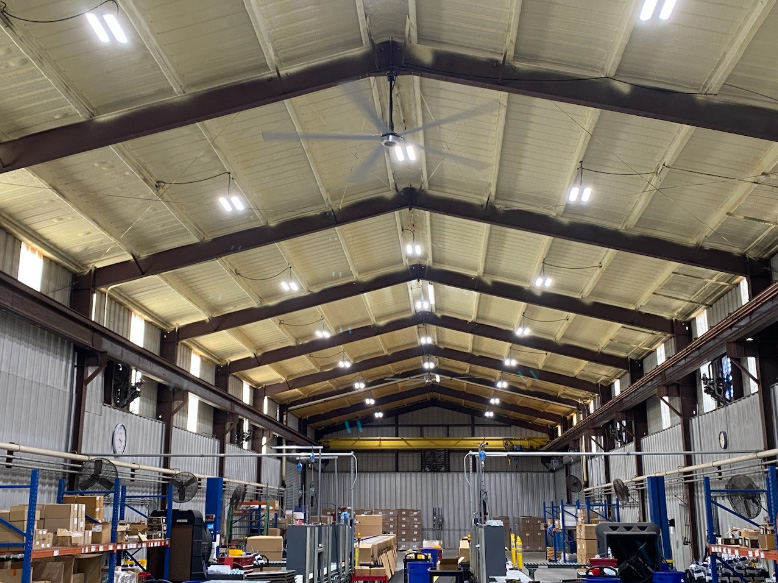
Amid growing concerns over climate change and sustainability, there’s an increasing necessity for eco-friendly cooling solutions in building design. The rising demand for air conditioning further strains our environment and resources. A practical, efficient answer lies in High Volume Low Speed (HVLS) fans. Distinguished by their substantial size and slow rotation, these fans circulate vast amounts of air at low speeds, offering consistent and gentle cooling. This blog post looks into the role of HVLS fans in eco-friendly building design and their contribution to sustainable, comfortable interiors. We’ll examine their design, technology, advantages, and uses, uncovering how these impressive devices can achieve sustainable cooling.
Understanding HVLS Fans and Their Efficiency
HVLS fans are known for their ability to circulate large amounts of air due to their oversized blades, operating at slower speeds. Their smart design facilitates efficient air circulation over extensive spaces, resulting in a cool, comfortable environment with reduced energy consumption than traditional cooling systems. HVLS fans can perceptibly lower room temperatures by several degrees by leveraging both evaporative cooling and destratification processes. Owing to their innovative design and the harnessing of natural air movement to promote cooling, HVLS fans offer a more eco-friendly alternative to conventional HVAC systems. This proves that vast air movement can be both energy-conserving and comfort-enhancing.
The Need for Sustainable Cooling
Rising global temperatures and the continual advance of urbanization highlight an urgent requirement for sustainable cooling solutions. A significant percentage of global energy use comes from buildings, with traditional cooling techniques leading to heightened energy demand and augmented carbon output. This pressing ecological issue necessitates a move towards innovative, eco-friendly cooling systems. Sustainable cooling isn’t merely a choice but a crucial component in our joint endeavor to counter climate change, lessen reliance on energy, and construct healthier habitats for the next generations.
The Role of HVLS Fans in Green Building Design
In the landscape of sustainable architecture, HVLS fans act as vital components due to their alignment with the core principles of green building design. Their energy-efficient operation significantly reduces the reliance on conventional cooling systems, thereby minimizing a building’s carbon footprint and supporting the pursuit of sustainability certifications. Suitable for a wide range of applications, from large commercial spaces to intimate office settings, these fans enhance the adaptability of green building strategies. By leveraging the natural process of air movement, HVLS fans underscore the importance of integrating low-impact, high-efficiency cooling technologies in modern sustainable constructions, making them indispensable in creating environmentally conscious and energy-efficient buildings.
Energy Savings and Reduced Environmental Impact
Incorporating HVLS fans into the architecture of green buildings presents a significant opportunity for energy conservation. These fans optimize air circulation with minimal electrical input, drastically reducing the demand on conventional air conditioning systems. This efficiency translates to a notable decrease in energy usage, aligning with the environmental goals of reducing greenhouse gas emissions. The consequent financial benefits from lower utility costs further underscore the economic advantage of integrating HVLS fans. Additionally, their long service life and minimal maintenance requirements diminish resource waste and environmental strain, solidifying their role as a sustainable cooling solution. Through these mechanisms, HVLS fans contribute to a greener, more sustainable future in building design, emphasizing the potential for significant environmental and economic gains without compromising indoor comfort.
Enhancing Indoor Air Quality and Occupant Comfort
HVLS fans crucially enhance indoor air quality through the steady movement of fresh air, minimizing the buildup of pollutants, allergens, and humidity. Such circulation not only filters the air but also cultivates a healthier, more comfortable habitat for individuals. The mild draft created by these fans provides a natural cooling sensation, allowing interior spaces to feel chilled without the necessity to decrease thermostat controls. This dual benefit of air quality and thermal comfort plays a vital part in crafting a favorable indoor ambiance, which is fundamental for people’s well-being and productivity.
Integrating HVLS Fans with Other Sustainable Technologies
HVLS fans boost the sustainability factor of green buildings by smoothly integrating various eco-friendly technologies. Their synergistic operation with solar energy systems not only maximizes efficiency but also ensures eco-friendliness. Pairing these fans with intelligent building technologies like automated sensors and thermostats enhances their functionality. This allows the fans to run only when needed, optimizing energy usage and minimizing waste. The partnership between HVLS fans and renewable energy sources, coupled with smart building controls, embodies the perfect blend of high-efficiency cooling and sustainable building practices. Such a strategy not only heightens the energy-conserving capabilities of HVLS fans but also fortifies the pledge to build environmentally friendly and energy-efficient spaces.
Conclusion
Ready to make your building an epitome of sustainability and efficiency? Look no further, as Refresh Fans offers HVLS fan solutions customized to your requirements. Our team ensures a seamless journey from selecting to installing HVLS fans, optimizing your space for cooling and air quality enhancement. Venture into the future of eco-friendly building design with our advanced HVLS fans. To learn how Refresh Fans can help meet your sustainability targets or to arrange a consultation, reach out to us now. Let us assist you in significantly improving your energy efficiency and shrinking your environmental impact.